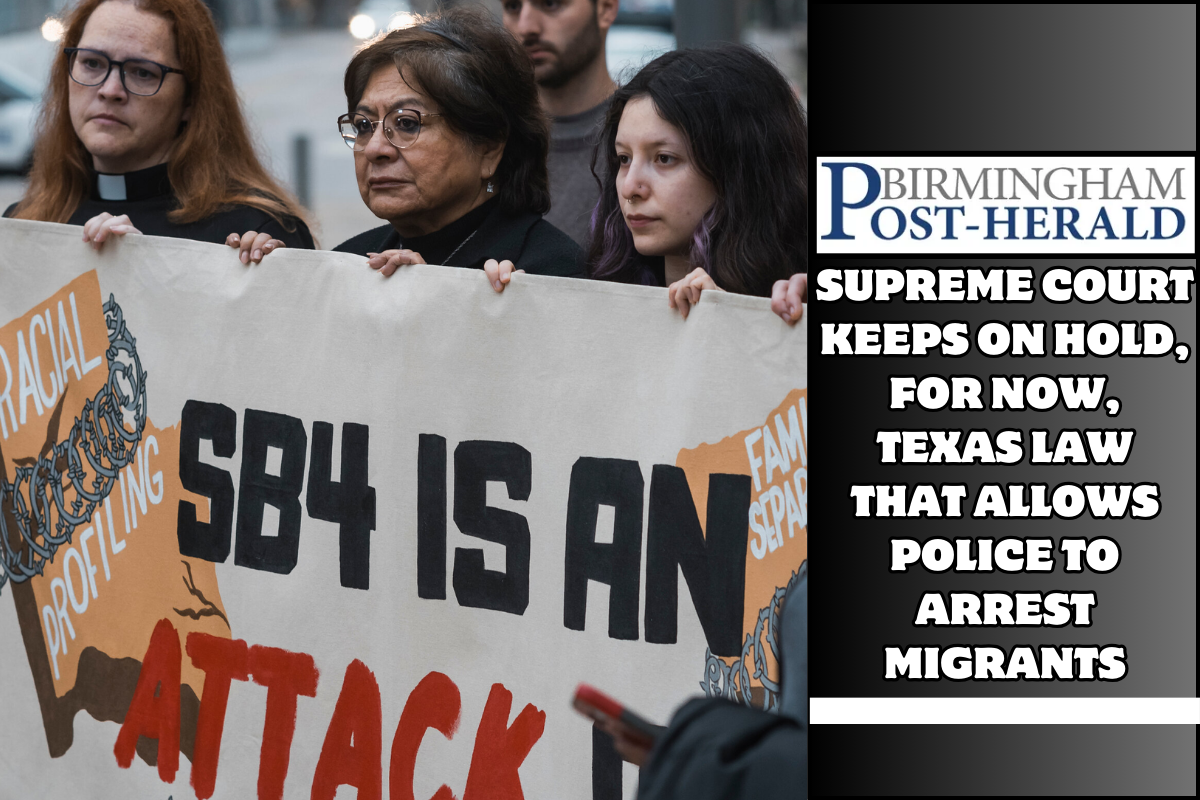Supreme Court keeps on hold, for now, Texas law that allows police to arrest migrants:-IN WASHINGTON − Monday, the Supreme Court stepped in on the latest fight between the Biden administration and Texas over the southern border. The Court stopped a controversial state law from going into effect while it is being fought in court.
Supreme Court keeps on hold, for now, Texas law that allows police to arrest migrants
The court quickly responded to an emergency appeal from the Justice Department on Monday afternoon by saying it would put on hold until at least March 13 a Texas law that lets state police arrest and deport people who are coming into or staying in the U.S. illegally.
A group of judges from the U.S. Court of Appeals for the 5th Circuit in New Orleans said the law would take effect on Saturday unless the Supreme Court stepped in.
In its emergency appeal to the high court, the Justice Department said that would “create chaos” in the federal government’s work to enforce federal immigration law in Texas.
The department said the law was “straightly at odds” with previous decisions by the high court, which said that only the federal government has the power to let noncitizens in or kick them out.
The emergency appeal is the latest move by the federal government to try to get rid of the law. It is also part of a bigger, very heated fight between Texas and the Biden administration over how to enforce the southern border.
Record numbers of people have crossed the southern border, and Texas Gov. Greg Abbott says the federal government isn’t doing its job. His crackdown on the border includes a program to bus refugees out of the state and put razor wire barriers in the Rio Grande.

Also Read:-Judge orders prison for Michigan man who made threats against Jewish people, synagogue
On Thursday, U.S. District Judge David Alan Ezra temporarily stopped Texas from enforcing the rule that would have made crossing the border between Texas and Mexico a state crime. Along with the order that blocked the lawsuit, Ezra said that “states may not exercise immigration enforcement power except as authorized by the federal government.”
Ezra said in the order that increases in immigration are not a “invasion” under the Constitution and that Texas is not at war by implementing SB4.
But on Saturday, the appeals court agreed to let Texas step in. This gives the Biden administration one week to ask the Supreme Court to decide if the law should go into effect while the case is still being heard.
That date was pushed back by the Supreme Court on Monday. Texas now has until March 11 to explain to the justices why the law shouldn’t be put on hold.
The law is being fought against not only by the federal government but also by El Paso County, Texas, and the Las Americas Immigrant Advocacy Center, which helps asylum seekers and other immigrants in El Paso get free legal help.
Abbott and the lawmakers who wrote the bill say that state troopers will only go after people who are accused of crossing the border illegally and not people who have lived in Texas for a long time.Leaders of border towns and people who support immigrants say the law will unfairly target their mostly Hispanic neighborhoods.
People from both the United States and Mexico cross the border legally to see family, go to school, or do business. This affects both big border cities like El Paso and Laredo and small towns like Roma and Eagle Pass.
To the Supreme Court, the Justice Department said that letting Texas send migrants back to Mexico would “have significant and immediate adverse effects on the United States’ relationship with Mexico—a relationship that is critical to the federal government’s ability to effectively address immigration at the southwest border.”
The head of Las Americas, Marisa Limón Garza, is afraid that S.B. 4 will lead to racial profiling, especially in border communities..
“I don’t get a stamp in my passport book when we cross here in El Paso with a passport or a visa,” she said. “If there is no proof, how will the state troopers know I never crossed the line?” The government says, “Police officers are well-trained, and they will be able to decide based on behavior.” If you aren’t white or passing, the law can hit you hard.
